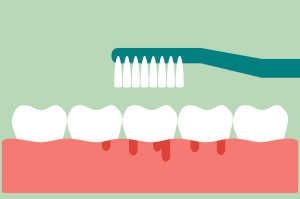 Three out of four Americans suffer from gum disease, according to the American Academy of Periodontology. So you know what that means? It means 3 out of 4 Americans deal with bleeding gums when they floss their teeth. We’ve put together a list of reasons why gums bleed and a list of ways how to make them stop.
Three out of four Americans suffer from gum disease, according to the American Academy of Periodontology. So you know what that means? It means 3 out of 4 Americans deal with bleeding gums when they floss their teeth. We’ve put together a list of reasons why gums bleed and a list of ways how to make them stop.
For most folks, there is a big disconnect between gingivitis, periodontal disease, and cavities. Perhaps it’s because of the fancy names, perhaps it’s because we don’t like the idea of tiny little bugs eating our flesh and bones. But denial is dental suicide. So if you take away only one takeaway from this article, let it be this: irritated gums (gingivitis) beget damaged gums (periodontal disease) which beget damaged teeth. And all of that can lead to bleeding gums, especially when you floss.
Why gums bleed
Bugs—As bacteria from plaque/tartar accumulates along the gumline, it causes gums to swell up. Taking floss to your teeth and gums at this time will likely result in some bleeding. The good news is that the more you floss and brush and get your teeth cleaned, the less you will bleed.
Diabetes—Diabetes causes inflammation over many areas of the body, including the gums. And inflamed gums are likely to bleed. If you are diabetic and regular flossing is causing bleeding, please let your doctor know.
Malocclusion—This fancy word means teeth are not aligned the way they should be aligned. That can spell trouble if the misalignment means that one tooth is scraping the enamel of another, or if the alignment is making it hard to clean the affected, surrounding teeth. Orthodontic work may be necessary.
Meds—When we bleed, we eventually stop bleeding, thanks to the body’s ability to clot its own blood. Certain pharmaceuticals will trigger bleeding of the gums because they are anticoagulants. Make sure your doctor and pharmacist are aware of any prolonged trouble you may be having.
Preggers—Pregnancy causes hormonal changes, and some of those changes cause an increase in blood flow. Pregnancy gingivitis occurs when that blood flow spike goes to the gums and causes inflammation and sensitivity.
Rough stuff—Thorough brushing and flossing does not require rigor. Brushing your teeth roughly, especially if you dare to use hard bristle toothbrushes, wears down enamel. Flossing quickly and vigorously can cause abrasion to your gum tissue. Relax, rinse, repeat. Relax, rinse, repeat.
Vitamin deficiency—Vitamin K is an essential part of the body’s blood clotting system. If someone lacks it, they may see an increase in bleeding of the gums. Vitamin C is ascorbic acid, an anti-inflammatory of sorts. Without it, gums inflame. And that means gums will bleed.
How to make the bleeding stop
Obviously, the more you brush, floss and get regular cleanings, the less issue you will have with bleeding gums. But here are some more nuanced tips you may be overlooking:
Healthy eats—Vitamins A, C, and K and nutrients like calcium and magnesium all play a role in optimal gum health. Getting your carbs from fruits and vegetables, rather than candies and sodas is also a good way to reduce the amount of sugars in your mouth that wear away at your teeth thanks to the bacteria that feed off sugar.
Relax—A study in the Journal of Periodontology showed that women with stress-related depression and exhaustion had more plaque accumulation. Our immune systems work better when our stress levels are reduced. Chill out with a nap, a massage or a hot tub soak whenever you can.
Share less—No need to be selfish with your time, energy or excess funds, but when it comes to your gums, look out for number one. Gum disease is contagious, just like a cold. So be on the safe side when it comes to sharing things like water bottles or taking sips from other people’s drinks. Sharing a toothbrush? Come on now.
See us more—Shameless plug? Not really. The only things more important than regular brushing or flossing are regular exams and cleanings. At DentaLux, we’ll set you up with a dental game plan that will help improve, maintain and prevent the conditions that cause your gums to bleed. Call us please.







Leave a Reply